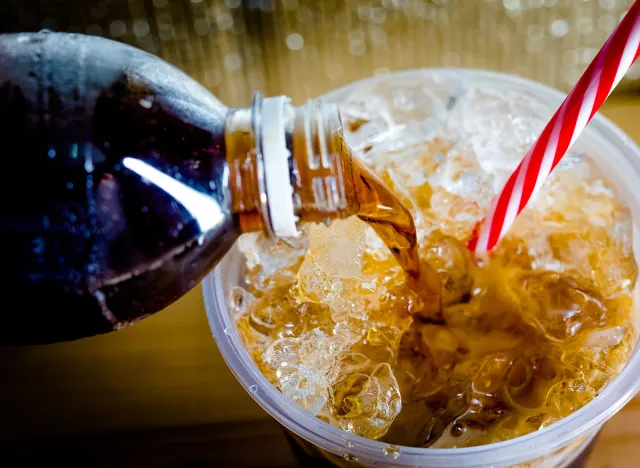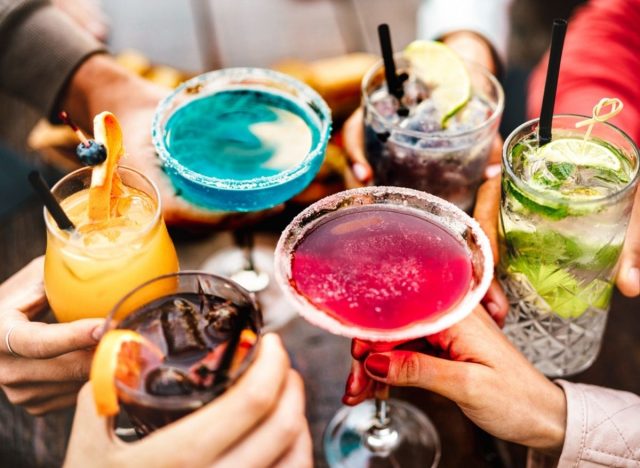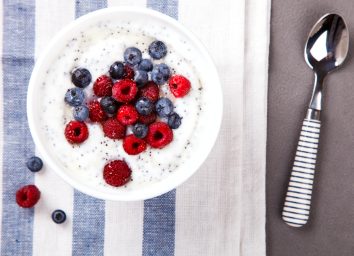3 Drinks That May Be Aging Your Brain Faster

It’s natural for your brain to age over time, just like the rest of your body. However, your diet and lifestyle can also impact the rate at which your brain ages. Certain habits may slow down the brain aging process, while others may speed it up.
As with most diet and lifestyle choices, moderation is key; you shouldn’t deprive yourself all the time, but when you’re habitually making poor choices, things can get dicey. So, consuming foods or drinks loaded with sugar every now and then isn’t going to prematurely age your brain, but regularly consuming added sugar in large quantities may contribute to complications with your brain and cognitive health (not to mention a whole host of other health issues).
Read on to learn more about some of the drinks that may contribute to aging your brain faster. And for more, check out The Worst Foods Increasing Your Risk of Dementia.
Soda can age your brain.

A 2017 study published in Alzheimer’s & Dementia found that soda was associated with accelerated brain aging and that the participants who drank at least one soda every day experienced higher instances of a decrease in brain volume.
The participants who drank soda on a regular basis also had poorer “episodic” memory—that is, the longer-term memory recollection of past events.
Many of these participants also had smaller volumes of their hippocampus, which is a part of the brain responsible for much of our memory and learning functions. Our hippocampal volume naturally decreases with age, but this study suggests that regular consumption of sugar-sweetened beverages may accelerate this process.
Diet soda can age your brain too.

After reading about the effects drinking soda may have on your brain’s aging process, your gut reaction might be to assume that diet soda is a better option. Unfortunately, research has also found a connection between diet soda and brain health.
One study published in Stroke found that participants who had consumed one diet soda daily were almost three times more likely to develop a stroke or dementia. These findings are surprising, and more research needs to be done, especially because the study noted that they weren’t able to account for certain conditions that the participants may have developed during the course of the study, such as diabetes. Still, it’s enough of a reason to rethink whether you really need to drink a diet soda every day.
Alcohol may impact your brain—even in moderation.

Drinking in excess—or binge drinking—is something that most everyone agrees can speed up your brain’s aging process. But what is up for debate is whether or not alcohol consumed in moderation can impact your cognition as well.
The current research is conflicting. Some of the longest-living people in the world, residing in what’s known as the Blue Zone regions, drink a glass of red wine regularly and are known for having almost no cases of Alzheimer’s disease or dementia.
But recent research from 2022 shows that just one or two drinks a day may negatively impact your brain. According to a study published in Nature, drinking even moderate amounts of alcohol was found to shrink both white and grey matter, which are parts of the brain that are responsible for different cognitive functions.
The research that exists about soda, diet soda, and alcohol and their relationship to the brain’s aging process, can be overwhelming and in some cases inconclusive. The rate at which your brain ages doesn’t depend on any one thing, and it’s impractical and unhealthy to live in a constant state of self-deprivation. But educating yourself with the best information is always a good idea, and if you want to ease your mind, talk with your doctor about the best ways to care for your brain health as you age.








